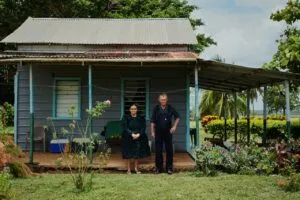What does the success of Mennonites in Belize tell us?
An examination of a sustainable way of life.

Mennonite boys in Belize selling drinks to tourists
My brother, a Mennonite from Manitoba, is currently in Belize helping with a charity that supports orphans from Haiti. Due to the violence there they have had to move their orphans to a safe place: they found Belize willing to accept these orphans and found that the area with the best support was the Mennonite area within Belize. Let’s explore what is unique about this community, hypothesize why they are so successful and what lessons from this community can be applied to us.
First, a bit of background. The first Mennonites came to Belize in 1957 as part of a diplomatic mission. These Mennonites, who emigrated from various Canadian locations, came to Belize (British Honduras) from Chihuahua, Mexico, where they had been living for many years. The vast majority – more than 95% – of ethnic Mennonites in Belize speak Plautdietsch in everyday life. Their religion and language unifies them and allows a high degree of trust and cooperation. There are now around 10,000 Mennonites. They have created an almost First World community in the middle of the jungle in a 3rd world country. How did they do that?

Areas in red are regions controlled by Mennonite communities
According to my brother their success rests on the fact that they are very good business people. Their religion inspires them to not be dependent upon others so they never work for large corporations or governments but start their own independent businesses, and by that I also means farms – which is the core of any Mennonite community in the world. Another part of their success [and limitation – more on that later] is that most groups are very traditional. As can be seen from the chart below comparing populations of various groups the more traditional groups have more children. It turns out that this traditional set of values also preserves their cultural identity, independence and ability to work in a trusting manner together with a focus on what is best of the long term future of the community instead of a focus on individual gain.
Traditional Colony started 1958 with 1946 and now a population of 4503.
Very modern colony started 1948 with 400 and now a population of 407.
Today, Mennonites dominate Belize’s domestic poultry and dairy markets, despite representing less 4% of the population. Their businesses, that focus on replacing imported goods for locally made ones, are a runaway success and employ many non Mennonites. In fact, where my brother resides, he tells me that the community is surrounded by non Mennonites [who cannot own land within the Mennonite area] who are happily employed in these businesses. Their only problem is their success: in 50 years they have created a standard of living much higher than the local population and created some envy – a problem the leadership is well aware of and trying to find solutions to. The communities are mostly reliant on commercial agriculture, with colonies organized not only around family and religion, but also labor. My brother discovered a world frozen in time (an idea alluded to by the title of a new book, “c.1950”- see link ). This is a quote from another person who visited [see link]: “But beyond the obvious anachronisms of technology-free homes and women dressed in bonnets, the resulting photographs hint at an idyllic life centered on family – and free from the trappings of modernity. “My whole practice shifted as the days like went on. My mind slowed down, and I was more present in the surroundings,” he said, adding: “I’m not trying to say that their lives are simple, but I think it, for me, it just allowed me to slow down and be more present.”

Looks perfect right? Not exactly; their Achilles heel is education. Because of their traditionalism they do not encourage higher education – and that means High School. Permitted to run their own schools, Belize’s Mennonites have literacy rates significantly lower than the country’s other ethnic groups, with just 5% completing formal secondary education. And yet, even without this, they run very successful businesses and are an economic and social success. As a teacher I find this puzzling but it does make one ponder.
So, what can they teach us? “Success”, as in living a high quality of life that is peaceful and environmentally sustainable, requires:
- Social cohesion
- Small business focus for the economy
- Food independence
- Focus on the community instead of the individual
Could we apply these ideas to Canada? I think so. Do we need to wear bonnets or have a beard? No. What we do need is being realistic about how our way of life feels to many like they are being left; that our environment is being destroyed to meet our “needs”. Perhaps we can learn from examples of ways of life that work for a society AND Nature. I think these Mennonites have something we can learn from and, after some modifications, apply to how we live in Canada. Do you agree?
If you want to read more go to https://www.cnn.com/style/article/belize-mennonites-jake-michaels/index.html
Leave a Reply